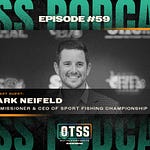Alex Rawlings on Only The Strong Survive
In this first episode of a two-part “Only The Strong Survive” series, host Dan Kahn talks with Alex Rawlings about private equity. As the host of “The Private Equity Podcast,” Rawlings is an expert voice deeply entrenched in the subject. He is also the founder and managing partner of Raw Selection, a U.K.-based executive recruitment firm that finds C-suite executives for private equity companies. Over his career, Rawlings has developed an in-depth understanding of how private equity functions and its many intricacies.
Private equity is an often misunderstood and murky topic. While private equity has strong benefits, it also doesn’t enjoy the best reputation. So, what exactly is private equity, and is it good or bad? Is it something your brand should be looking at? The answers are complex, but Dan and Alex break it all down in this episode of “Only The Strong Survive.” Click on the icon above to listen to the whole discussion, and make sure to stay tuned for the next episode as we dive deeper into private equity. Here are our top takeaways:
Private equity is a highly regulated and complex industry.
There is a lot of money generated by private equity.
Most private equity backed companies are sold multiple times to other private equity firms.
The focus of private equity is usually on short-term growth.
How Does Private Equity Work?
In simplistic terms, private equity follows a similar business model to house flippers. A PE group purchases a company with a loan, but the company pays off the loan. The PE group then improves the company’s profits, usually by merging it with other companies. After doing this over a few years (typically 3-7 years), the group then “flips” the company to another buyer, hopefully for a significant profit.
“Once they (a private equity firm) have raised capital, they will go to market to deploy capital. And when we say deploy capital, they want to buy X, Y or Z business,” says Alex. “Let’s say that business is doing $10 million, their goal will be to take it to $100 million. How the hell are they going to get it to $100 million in 3, 5 or 7 years? Private equity firms are not very good at doing organic growth. They are very good at doing “roll-ups” or basically acquiring competitors or similar companies and rolling up the back office systems into it, increasing the EBITDA and scaling that business on the front end.”
Private Equity is Highly Regulated
Finding someone to talk about private equity is a challenge. That difficulty stems from private equity being highly regulated, and laws govern what can be said about existing and upcoming deals. The lack of people willing to discuss PE isn’t nefarious, but most companies prefer to operate behind the scenes and avoid opening themselves up to any potential liability.
“It is heavily regulated. Same as in Europe as it is in the U.S., and it is just very stringent,” says Alex. “Therefore, people fear going out and having those conversations. Plus, it is just financial services. Law firms are a bit of the same, where they don’t want to break any eggs. But we are starting to see more personal brands coming out in private equity and more companies disrupting things.”
It is Extremely Profitable
The financial industry creates the most millionaires of any job segment. Within that industry, private equity produces the vast majority of those earning seven figures or significantly more. Private equity generates an extraordinary amount of wealth, which is why it continues to be so popular.
“There have been some bad moves, but for the most part, they (private equity firms) have done phenomenal growth of organizations,” says Alex. “Some of these businesses have created huge returns. The biggest one I know of is a 300-times return on a portfolio acquisition. For a simplistic basis, if they acquired that business for $10 million, they have produced a 300 times return on that 10. And that would be small. They wouldn’t have done just $10 million.”
Private Equity “Feeds” Upon Itself
One unique aspect of private equity is that a PE-bought business is often sold multiple times. Almost every time a PE-backed business is sold, it is to another private equity firm. Different levels of private equity companies look to purchase businesses of various sizes. A lack of buyers is rare, as there is almost always someone willing to take a stab at it.
“There are loads of different private equity firms,” says Alex. “It is a bit like banking levels. There are certain banks we haven’t heard of that we wouldn’t be able to put our money in because they want $100 million. Then there are bank accounts that don’t expect anything and ones that want $25,000 or $100,000. That goes on in private equity with some of these firms doing $1 billion acquisitions. It is not just $5 million or here is X amount of money. There are lots of rounds.”
Is Private Equity Just Trying to Make a Quick Buck?
For every backer of private equity, there is a detractor, and most have a mixed opinion of it. One ding to PE’s reputation is that it is only interested in making fast money and could care less about a company's long-term well-being. We asked Alex if private equity is solely focused on making a quick buck. His answer was an interesting one.
“As someone who supplies into the industry, my answer to that question should be that I think they (private equity firms) are really focused on long-term growth,” says Alex. My actual answer is that I don’t think enough of them are. I think a lot of them are just focused on the exit. That might be harsh but also fair to a certain extent. It really depends upon the private equity firm.”
Listen to the full podcast to get more of Alex and Dan’s insight into private equity.












